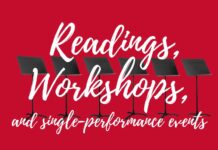Female theatre artists make up more than 50 percent of those involved in the theatre, yet the number of female playwrights being produced is dramatically lower. Welcome back to the conversation, and The Playwright’s Playground – an in-depth Playwright interview series with female playwrights in the D.C. theatre community.

In this continuing Series, I will interview and introduce DCMetroTheaterArts’ readers to the many talented playwrights in the DC/MD/VA area to learn about their writing process, their inspirations, their motivations, and struggles to write and produce their art. This month it is my pleasure to share an interview with Suzan-Lori Parks, the Pulitzer Prize-winning playwright of Topdog/Underdog, and writer of the adaptation of the 2012 Tony Award-winning Best Revival of a Musical The Gershwins’ Porgy and Bess. Currently on a 14-state tour, The Gershwins’ Porgy and Bess, is playing in Washington, D.C. at the National Theatre until this Sunday, December 29th.
In Part I: Suzan-Lori speaks candidly about her writing motivations and the changes made in her adaptation of Porgy and Bess, and shares details about her favorite song in the production.
________
SUZAN-LORI PARKS
“My writing all comes from listening. The more I listen, the more I can write.”

One of the boldest, most thought-provoking voices in American theater today is Pulitzer Prize-winning playwright Suzan-Lori Parks. Parks is the first African-American woman to win the Pulitzer Prize in Drama. Her writing style comes from listening, and that observant reflection has a deep resonance and influence on the rhythmic aesthetic and distinction of her writing. In addition to the Pulitzer win for her 2001 play Topdog/Underdog, Suzan-Lori Parks won a Tony Award in 2002 for the play, and was awarded a MacArthur Foundation “Genius Grants” grant that same year.
Porgy and Bess is an iconic American opera masterpiece. The reimagined musical version, The Gershwins’ Porgy and Bess, directed by Diane Paulus (Tony winner for Pippin this year) and adapted by Suzan-Lori Parks, won the Tony Award in 2012 for Best Musical Revival. Conceived to bring the story to a broader audience beyond opera, Parks said she wanted to adapt the book so that it matched the music in importance. Songs don’t lie, and Porgy and Bess boasts some of the most beloved tunes from the Great American Songbook, including “Summertime,” “It Ain’t Necessarily So,” and “I Got Plenty of Nothing.”
Known for creating theater that uses rhythmic, poetic language, a core element of her writing style is repetition and revision, and her style is often highly metaphorical. She said the idea of repetition with revision means “looking back and stepping forward at the same time.”
In our interview exchange, it was immediately striking to me, how often this core
philosophy was reflected in her thought process and conversation.
______
Sydney-Chanele: How did the characters in Porgy and Bess speak to you as you were writing the adaptation? What did you listen to and hear during your writing process?
Suzan-Lori : With Porgy and Bess, writing comes from listening… and listening to the music. So many of my ideas come from deepening the characters and their character’s relationships, and deepen their truth in the plot, are really achieved by the music. The epic scope of the music, the beautiful recurring motifs, as I listened and listened, and relistened to the music I allowed it to inform the adaptation that I did with the book. The best example of listening, is listening to a particular thing, and that’s how it helped greatly with Porgy and Bess. Porgy and Bess has that mythic, epic scope of the music, and now I feel like with the book that it also has that same mythic and epic sweep.
For example, when Crown comes back to the final confrontation with Porgy, and he says, “I’ve come back to get you Porgy.” And Porgy says, “No, you’ve come to meet your God.” That kind of epic type of huge sweep was totally, totally informed by the music that the Gershwins wrote.
What voice do you hear, and /or what type of listening do you do when it comes to writing your own work?
It comes from listening to that small, still voice from within. There are lots of playwrights who have ideas and concepts that they want to communicate. And, I’m more – I listen within. I can’t explain it. It’s like meditation – you have to listen to the small, still voice within and you allow that voice to guide your life. It’s like a meditation practice, and I’ve allowed that to guide my writing.
Let’s talk about your adaptation of The Gershwins’ Porgy and Bess. Many critics originally thought of the African-Americans in Porgy and Bess as a racist portrayal. So, I have two questions: Do you still think of the story as controversial? And, how do you want the new adaptation to be discovered by this new generation of viewers?
Well, for the record, I didn’t read anything about what people thought about Porgy and Bess going into it. All I did was listen to the music, and I read the book (libretto – the text of the opera) as the music was playing. I followed along. Then, of course I read the novel and did the research necessary to [Dubose] Heyward’s and [George] Gershwin’s experience working on the show and all that.

Was that your first introduction to Porgy and Bess, when you were asked to adapt it?
I had seen about ten minutes of it, as a child, on the late, late show – the movie version.
So you’ve seen the film directed by Otto Preminger? It’s rare to find a copy now.
I wasn’t familiar with the story. I was familiar with some of the songs of course, but no, I wasn’t familiar with it before then. And just listen to the music and read the book, the libretto.
What was your reaction after you read it?
I thought it was something that needed adaptation. Lucky for me, because they hired me. I didn’t find it controversial because… I just found it needing an adaptation. And this is where people get it wrong, not to make it ‘right, or make it politically correct.’ [Her voice heightens and her voice takes on a nasal vocal tone].
Come on, gives us a break already. We wanted to make it better. Better… A more perfect union … (she sings joyously, as her voice trails off). Hello. Like amending the constitution, we want a better country. It’s not politically correct… so the people get all the hair on the back of their neck up. It’s not about that. It’s about making it better.
The music is Sooo great. Let us make the story just as great, if we possibly can.
Did you take out any songs, and tell me more about your job as the libretto adapter?
Yes, yes. The “Buzzard Song” has been cut and others … One – some songs have been cut purposely? (“Question mark,” she says out loud.) And two – vocally, it’s a big deal. Back in the day, it was an opera – too many songs for Porgy – you know what I mean. You have to think of these actors working and what they are being required to do. So it was the dramaturg and architectural type of things. It’s an architectural job. It became political because people got worried that we were trying to make it PC. If anybody knows anything about my work they know it’s not that!
How did you transform and make the characters well-rounded, three-dimensional characters?
Characters! Characters! Characters! You listen to that music and you listen to Porgy sing, ‘You are my woman.’ That’s not an archetype. It’s a man, right? (Parks says excitedly, describing her writing process.) So, it’s coming right out of the music. I just followed the music. That’s I how I found additional, brand-new words to put in, to change some of those songs. I listened. Not taking words from the songs – no. I’m listening to that spirit that was drumming in that piece. The song, “I Got Plenty of Nothing,” which hundreds of people from all over the country told me before they saw a production, that it was a ‘cringe worthy’ moment in the show. Why – because basically Porgy was singing about how happy he was. He was a ‘po’ happy black man,’ and black people, and white people, and Asian people, and Hispanic people found that cringe-worthy. Hello, the 99%. What! OK. OK.
Listening to it and living the lives of these characters, inviting them into my writer brain, I heard one day – Oh, I know what it needs…he’s talking about. There’s a bit of dialogue before the song now and in the middle of the song there’s a bit of dialogue that we added, so now he’s singin’ about love. He’s not singing about being ‘po.’ It’s a love song!
It’s a love song.
He walks out of his cabin, Bess walks by and they share an embrace. [Her voice changes as she animates, playing the different roles.] He says, ‘Good mornin’ everybody.’ And somebody says, “You’re looking better than good Porgy. Look at the smile on your face. Whatcha been up to lately?” And Porgy says, ‘Nothin.’ And the guys go, “NOTHIN’?” Because of course they know he’s been gettin’ it with Bess! That’s the story. And then he launches into “I Got Plenty of Nothing”…talking about love and relations with a person of his choosing. You know what I’m saying.
What is your favorite song in Porgy and Bess?
Oh, I don’t know. I think the one that we did, we really sorta changed the framing and the meaning -‘I Got Plenty of Nothing’ – so that’s the song. I’m really proud of that song. Everybody can enjoy Porgy and Bess. We’re not lowering it; we’re actually raising the bar.
When they sing, “Bess, You is My Woman Now” and the whole bit of scene work that I wrote to create this moment … and then when he sings that song, it’s like, “Wuh! Oh my God! They’re really in love!”
You’re deepening the interpretation.
Yeah, we added story and took story and recut the thing. There was so much work involved and we had such a great team: Diane Paulus (Director), Deidre Murray (Obie Award-winning composer), and the wonderful cast … and we have now with the touring company. This brilliant cast of actors, sing like birds and dance like angels. It’s really kind of amazing!

_____
Tomorrow in Part II: Suzan-Lori discuss her writing process and inspirations, the autobiographical elements in her original works, and the responsibility and influence of winning major awards, like the Pulitzer Prize.
The Gershwins’ Porgy and Bess plays through this Sunday, December 29, 2013 at The National Theatre – 1321 Pennsylvania Avenue, NW, in Washington, DC. For tickets, (800) 514-3849, or purchase them online.
LINK
Suzan-Lori Parks’ website.
Playwright’s Playground by Sydney-Chanele Dawkins:
‘The Playwright’s Playground Series’: Jacqueline E. Lawton-Part 1, Part 2, and Part 3 by Sydney-Chanele Dawkins.
‘The Playwright’s Playground’: Allyson Currin-Part 1 and Part 2 by Sydney-Chanele Dawkins.
Watch the entire Otto Preminger directed 1959 film version of Porgy and Bess:
https://youtu.be/5daT-MSf09I




